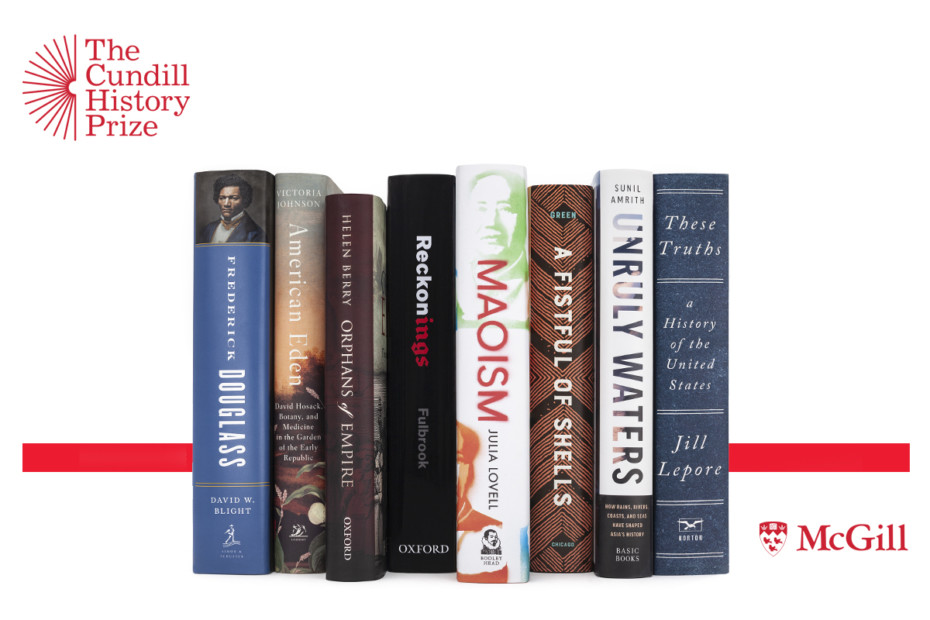 The shortlist for the prestigious Cundill History Prize was announced last evening at a lively event hosted by the Consulate General of Canada in New York. The Chair of the jury, twice Pulitzer Prize-winning historian, Alan Taylor, was joined by his distinguished jury colleagues to discuss the eight titles vying for the prize.
The shortlist for the prestigious Cundill History Prize was announced last evening at a lively event hosted by the Consulate General of Canada in New York. The Chair of the jury, twice Pulitzer Prize-winning historian, Alan Taylor, was joined by his distinguished jury colleagues to discuss the eight titles vying for the prize.
The historians on the shortlist – five women and three men – have more than 15 prestigious literary prizes between them, including the Pulitzer Prize and Wolfson History Prize.
The books on the shortlist cover a wide breadth of time and place. What unites the books is their ability to link the past to the present, helping us grasp contemporary dilemmas by charting their development through time.
Alan Taylor praised the shortlisted books, which “combine a depth of research, with innovative questions and clear prose meant to communicate, often beautifully, to general readers as well as academic scholars.”
Antonia Maioni, Dean of the Faculty of Arts, thought the jury’s selection was “stimulating, exciting, challenging – this shortlist reflects the very best history writing produced anywhere in the world.”
The 2019 shortlist
- Unruly Waters: How Rains, Rivers, Coasts, and Seas Have Shaped Asia’s History
Harvard Historian Sunil Amrith follows monsoons, mountain rivers, and ocean currents to trace the dramatic history of water in South Asia, providing a new perspective on the region and urgent input into how to address global climate risks. - Orphans of Empire: The Fate of London’s Foundlings
British historian, Helen Berry, investigated what happened to the children who were raised at the London Foundling Hospital, Britain’s first home for children at risk of abandonment. - Frederick Douglass: America’s Prophet
Pulitzer Prize winner, David Blight, delivers the definitive biography of the most important African American of the 19th century: Frederick Douglass, the escaped slave who became the greatest orator of his day and one of the leading abolitionists. - Reckonings: Legacies of Nazi Persecution and the Quest of Justice
Mary Fulbrook, Professor of German History at UCL, explores the lives of both the victims and the perpetrators of the Holocaust. - A Fistful of Shells: West Africa from the Rise of the Slave Tare to the Age of Revolution
Toby Green collects the histories of West and West-Central Africa in an effort to show the complex kingdoms of art and finance that existed before colonial influence. - American Eden: David Hosack, Botany, and Medicine in the Garden of the Early Republic
Victoria Johnson, finalist for the 2019 Pulitzer Prize in History and New York-based historian, tells the untold story of one doctor’s visionary quest to build America’s first botanical garden in Manhattan. - These Truths: A History of the United States
Harvard Historian and New Yorker staff writer, Jill Lepore, delivers an ambitious one-volume history of the US, which places truth itself- a devotion to facts, proof, and evidence – at the centre of the nation’s history. - Maoism: A Global History
From the tea plantations of north India to the sierras of the Andes, from Paris’s fifth arrondissement, to the fields of Tanzania, Julia Lovell, Professor of Modern China at Birbeck College, re-evaluates Maoism as both a Chinese and an international force.
Watch the story unfold
Administered by McGill University, The Cundill History Prize is the leading international award for a book of non-fiction. Each year, a US$75,000 prize is awarded to a book that embodies historical scholarship, originality, literary quality and broad appeal. Two finalists receive US$10,000 each.
The prize strives to be international in scope and reach. After travelling to New York to announce its shortlist, the prize moves to Toronto’s Massey College, where the three finalists will be announced on October 16.
Following this, the prize returns home to Montreal for the winner announcement and a series of events on-campus. On November 13, 2018 prize winner Maya Jasanoff will deliver the annual Cundill Lecture on her winning book, The Dawn Watch: Joseph Conrad in a Global World. Jasanoff will share her experience of researching and writing this genre-defying title, which blends history, travelogue and literary criticism.
On November 14, Jasanoff will join the three finalists for the 2019 prize at the Cundill Forum — a panel discussion on the complexities of history-writing in the age of fake news.
Also on November 14 is the annual Cundill Fringe. A graduate student panel moderated by Jason Opal, Chair of the Department of History and Classical Studies, will discuss the three titles in contention for the prize. The event culminates in a People’s Choice vote, where audience members and live-streamers are invited to select a winner.
Just hours after the Cundill Fringe, the 2019 winner will be announced at the annual Cundill History Prize Gala, held at the Montreal Museum of Fine Arts.
Follow the story at cundillprize.com
